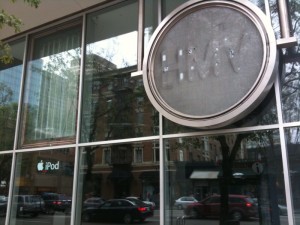Poised below a former iconic sign landmarking HMV’s presence at Burrand and Robson in Vancouver, is a little iPod sign. Appearing without threat, but determination like the children’s tale of the little red engine that could, it in fact did. Did topple an iconic brand from its throne.
HMV closed some months ago and now sits vacant waiting new tenants willing to pay high rent for a prime location. HMV was a victim in the end of changing technologies and distribution of its product. The fact that that the iPod was the product that introduced music digitization and sharing, and was ultimately the downfall of music sellers like HMV was poignant. Even more poignant since the iPod sign was the only thing left hanging in the store.
The iPad has recently disrupted another industry as well.
I was lamenting the closure of one of my favourite bookstores, Book Warehouse, in Vancouver recently. Although not encumbered by debt, overexpansion or an invisible cash flow, the owner was selling off the stock from multiple locations, and calling it quits. It would seem that the forces of increased online competition, a squeeze on margins, the emergence of e-books and readers, and a publishing industry reeling with the forces of technology and trying to redefine itself had taken its toll. That and the fact that the founders, all ready to retire were looking to sell their business at a time of great turmoil in the publishing and book industry.
But as the owner, an accomplished professional musician, said with a smile on his face the day I talked to him moving fixtures out of the Lonsdale location and packing up what was left of inventory to be donated to a first nations library, “The book business fed my music habit for over 30 years. I’m, happy!” Admittedly, it was a pretty positive spin on what could only be lamented as a huge shame in the face of changing technologies. A shame because there will be 5 less bookstores to browse in Vancouver. And a shame because, along with all the people who those stores have employed, the owners will not realize any equity from pouring over 30 years of time into the business.
Book Warehouse fended off the onslaught of big box bookstores in the 90’s when many independents failed. It withstood the ongoing price competition from online retailers such as Amazon. They had carved out a niche based on selling books bought back from publishers at huge discounts and then selling at bargain prices, while still achieving higher margins than their competitors. They were able to sell best sellers at huge discounts and still make money, unlike most competitors because their entire business model was based on low costs and no leverage. It worked for many years because it was not easily copied.
The lesson learned through these two examples? While you can have a defined market niche, a great product or service, and be at the top of your game, the external forces of technology and changing consumer habits can put it all into question. In the end every business must monitor and adapt to change.







